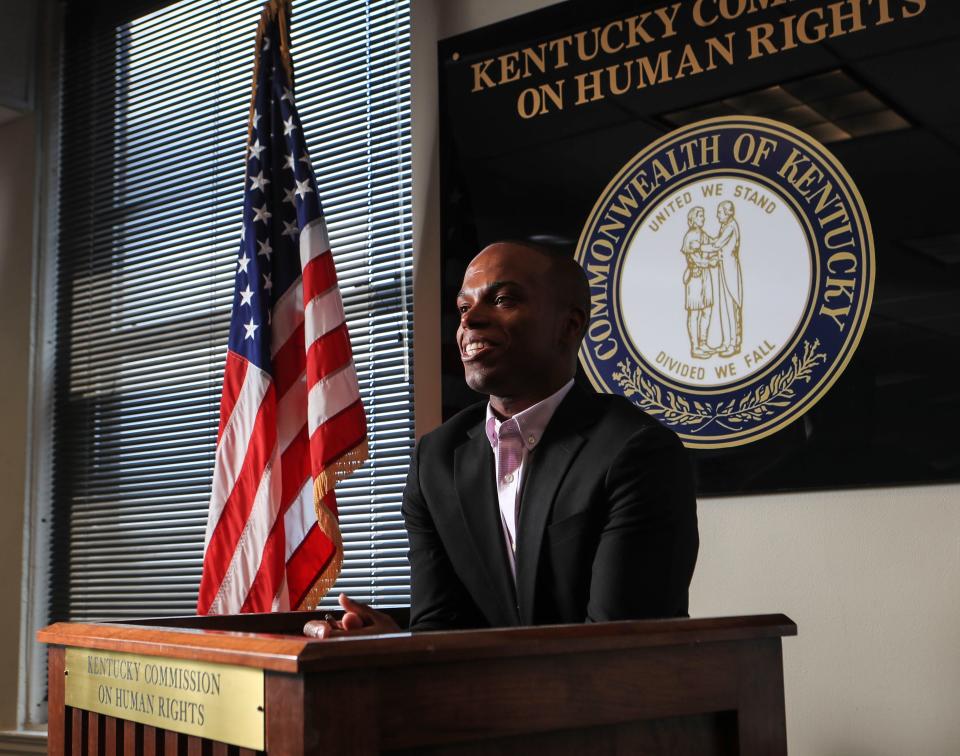JCPS proposed busing plan is racist. Why the special meeting when audit shows us a better way?
After successfully delaying the vote, the Jefferson County School Board now wants to call a special meeting to vote on a transportation plan that is racist at its worst and racially inequitable at its best.
Why are we even here?
Seriously, this is a thought not just held by me, but by other members of the Advisory Council for Racial Equity in JCPS moments like this and the late notice we received about this "special meeting."
Racial equity must be a driving factor in making transportation decisions
Racial equity has been, and must always be, a driving factor in decisions made pertaining to a large and diverse district such as JCPS. With that in mind, in 2018 the district approved a comprehensive racial equity plan that aimed to address longstanding inequities faced by students of color. This came at a time not dissimilar to now, a time where the district was under attack and facing numerous direct threats from the legislature and at that time the Executive branch as well.
And JCPS responded. The board responded. The racial equity policy and corresponding plan in essence saved this district and as part of that plan, created ACRE to aid and advise in implementation of this policy and other district matters in the pursuit of racial equity.
A JCPS audit confirms: The busing system is a disaster. But we already knew that.
The proposed transportation plan, if implemented, would operate in direct opposition to the ideals of equity this district claims to support, and would be in direct violation of the racial equity policy as approved in 2018.
The Racial Equity Policy District Commitment Section (b) states:
"The systemwide plan shall include strategies to… eliminate or alter school and District procedures and practices that create systemic racial disparities in educational opportunities and outcomes, including, but not limited to, disciplinary practices, identification of students for special education services, and access to programs and courses for enhanced or accelerated learning."
This proposed plan exists contrary to that commitment, as it creates and expands barriers to access for programs for enhanced or accelerated learning.
Further, commitment number (3), under the district policy directives around programmatic access states the following:
"The District shall increase enrollment and success in enhanced or accelerated educational programs and courses by Students of Color, including, but not limited to, magnet and optional programs, programs for Gifted and Talented students, Advance Program, Advanced Placement, Dual Credit, International Baccalaureate, Cambridge International, internships, apprenticeships, and career and technical programs."
JCPS deserves equitable access to magnet schools
The transportation proposal is in direct conflict with this district directive. The existing policy calls for uninterrupted and equitable access to the very types of programs (magnets) this plan seeks to do away with.
Part of our role in advising the district includes the analysis of the Racial Equity Analysis Protocol which is a tool used to identify racial inequities. While a passing REAP was presented to the board, there were other reviews of the same plan that failed this same analysis with no clear indication as to the difference in the plan aside from the makeup of those considering it.
Just like the change in who was on the Supreme Court shifted the analysis of laws and decisions like Roe v Wade or Affirmative Action, the legality or rightness of the policies didn’t change—the people deciding them did. And that same bait and switch occurred in who reviewed this transportation plan for racial inequities. When we, the body established to advise on such issues, look at this plan—it fails.
Breaking up JCPS won't solve anything. GOP is too focused on power, not student success.
JCPS decision-makers: JCPS decision-makers should visit Central High. They should see the anxiety they're causing.
Black and brown students are allowed to seek an enhanced and quality education and JCPS has shown time and time again the commitment to this very fact. At a time when this district and students have enough battles to face with threats from Frankfort, this is a fight that does not need to be fought.
A specially-called meeting, absent the voices of the community, is not what is in the best interest of the students. Neither is going back on the forward-thinking racial equity plan that was adopted in 2018.
What the district needs today is unity, to stand together to create the best quality education for every student in our city. If racial equity is what we want, why take actions contrary to that very goal? The audit of the transportation woes even said that there are other ways to do this, and peer districts have managed to solve this issue while not cutting access to magnets. Talk to them.
Don’t make decisions that can hurt JCPS students without doing due diligence. And as part of that process, talk to ACRE—because if you don’t want the advice of the advisory committee, what are we even doing here?

Terrance Sullivan is the Vice Chair for JCPS Advisory Council for Racial Equity (ACRE). He is the former Executive Director of the Kentucky Commission on Human Rights (KCHR). KCHR is the state agency charged with enforcing the Kentucky Civil Rights Act. Terrance is also a member of The Courier Journal's Advisory Board.
This article originally appeared on Louisville Courier Journal: JCPS audit showed a better way. Why vote to end busing for magnets?
